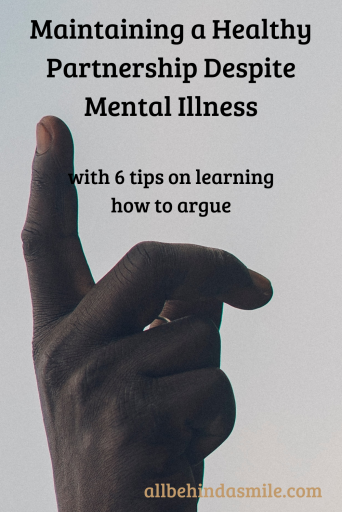After four years of dating, four months of being engaged, and now eight years of marriage, my spouse and I still have a lot to learn about marriage and each other.. but we have done a pretty good job of maintaining a healthy partnership despite mental illness that has only improved with time.

At the time of this writing, my spouse and I have two toddler boys together, and my husband works as a mental health counselor (which is always interesting to explain to people who also know that I suffer with mental illness).
Improving with Time
One of the key elements to any relationship is time. Getting to know the person, letting them get to know you, and doing lots and lots of learning. Learning likes and dislikes, adapting, and while you may not change who you are for them, definitely learning a bit of flexibility with your preferences versus theirs.
Arguments can, will (and probably should) happen. It’s a sign that you are communicating with each other (instead of stuffing your feelings). My husband and I have come a long way with our arguments, as well.
Learning How to Argue
Coming from an unhealthy home life to institutions and then married life, I didn’t know how to argue and had to learn. At one point during our years of dating, my (now) husband and I got into such a heated argument that I jabbed him with a pencil (do not do this, I am simply explaining that I was out of control). Name calling was the norm, with yelling, trash talking, and insults. Sounds really befitting a Christian, right? To “justify” my behavior, I told myself that I didn’t “use bad language”, so it wasn’t a sin.
Regardless of sin, it was destroying our relationship.
I had to learn to control my words, moderate my tone, and walk away when I didn’t feel like I could maintain physical control anymore. Although far from perfect, things have come a long ways in our over twelve combined years together.
Arguing in a Healthy Partnership Despite Mental Illness
There is so much relationship advice out there, but how much of it is from a Christian perspective to help those in a relationship as someone who is mentally ill? I’d venture to guess not nearly as much…
So we are going to focus on what the game changer was for our relationship (besides faith, we’ll talk about that a different day) – arguing.
If everyone argues (as mentioned prior) we need to work at arguing the right way. And although I can tell you what I *do*, telling you how I got to the point of doing those things seems more beneficial.
Pssst…. If you aren’t at a place in your mental health journey where you can learn how to argue, then you should read How Medication Changed My Life. I am not a doctor, and do not treat or diagnose anyone. It is worth talking to a doctor, however, if your mental illness is making your life more unstable than you prefer.
Learning to Argue
Filter all of these tips through a mental illness lens, okay? Because if you are here, one of you is likely dealing with mental illness, and it isn’t helpful to ignore that (important) fact.
- Prayer (a powerful tool that should not be overlooked)
- Practice – if you slip up, apologize – DO NOT just keep going like it doesn’t matter anymore because it DOES
- Think before you speak – even in a heated argument. We had such an issue with interrupting each other that now we have a special rule. When someone wants to speak, they hold up a finger. Then they add one finger for each point they want to make. It gives the speaker time to realize that the other person wants a turn to speak, while also giving the listener time to contemplate what they are about to say instead of just blurting it out and interrupting (which is rude anyways)
- Don’t use insults (even if they are veiled so they don’t seem insulting on the front end)
- Use disclaimers – if you are about to say something that might come across wrong, and it TRULY needs to be said, preface your statement with a DISCLAIMER. For instance, if my husband wanted to (kindly) tell me I smelled bad (and he has definitely done this) he would find a private location OR whisper in my ear (so it isn’t public), then tell me FIRST that he isn’t saying it to be rude, that he just wanted to bring it to my attention that I needed a shower (because he knows I get busy (or depressed) and ignore certain needs).
- Forgive DON’T forget – one of my Bible study ladies said this and it made so much sense. The gist was to forgive mistakes but don’t forget them (also don’t hold them over the other person’s head) because then you might end up back in the same mistake/pattern/situation all over again. Remember what went wrong and LEARN from it, so you can avoid making the same mistake twice.
This list could be longer, I’m sure, but these are the highlights. How are you doing maintaining a healthy partnership despite mental illness? Do you agree that learning how to argue is a game changer? Let me know in the comments below.

Christian, wife, “hybrid” mama, I run the site All Behind A Smile to help others like me.


Leave a Reply